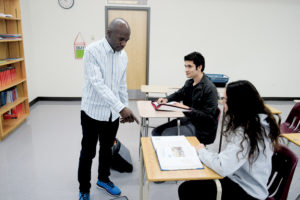Four local students recognized for French speaking talents with internationally-recognized diplomas
By JEREMY APPEL on February 11, 2020.
 NEWS PHOTO JEREMY APPEL
NEWS PHOTO JEREMY APPEL Medicine Hat Catholic Board of Education French immersion teacher Hugues Sonna instructs students Andre Muller and Mikayla Clarke, two of four who have received DELF certification.
André Mueller also saw his DELF exam as a “nice little conclusion to my time in French immersion,” which he began in Grade 1.
“I just wanted to wrap it up on a good note and having to prove I am officially bilingual, that’s internationally recognized and will give me more opportunities,” said Muller. For his oral examination, he delivered a presentation on archaeology. Mueller plans on going to McGill University in Montreal next year, while Clarke has her eyes set on the University of Alberta. The other two students who passed the exam are Zachary Jacobs and Dawson Sorensen. For Sonna, who originally hails from Cameroon, teaching French immersion hits close to home. “As a francophone speaker, I must say that when I got my Canadian citizenship, I went downtown to the government building to establish passport and was surprised to learn there was no one who could read my birth certificate, which was in French,” he said. At the time he lived in Edmonton, so he had to travel down to Calgary to find somebody who could understand the document. “I got a little bit frustrated,” said Sonna. “I encourage people – the community and government – to come together and see how we can improve our French program, because we really need French people around here, in the town and province, so what happened to me doesn’t have to happen to other French-speaking people.” 21-20


